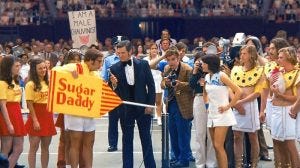Battle of the Sexes

I think with almost any movie, it should be the intent to garner empathy for the protagonist from the audience. Whether your protagonist is a good or bad person, a hero or villain, viewers connect to stories by being able to feel what the character is feeling or relating to it in some form or another. Of course, there are movies where the antagonist is more memorable and charismatic than the protagonist — No Country for Old Men, The Dark Knight, even (arguably) Star Wars. But the important thing about these movies is that the interest garnered by the antagonist only makes the narrative more compelling; it never derails the viewer's desire to see good triumph. This is where Battle of the Sexes goes wrong.
That's not to say that its villain, infamous tennis player and “chauvinist pig” Bobby Riggs (Steve Carell), is so engaging and unforgettable that he should be exalted to the ranks of “great movie villains.” Far from it. But he does manage to earn empathy, which is more than Emma Stone’s hero, Billie Jean King, manages to accomplish.
Largely, this comes down to the way the film balances King's flaws and mistakes with her positive ideals and achievements. In the first several minutes, we're shown that King is willing to cheat on her husband Larry with her hairdresser, Marilyn Barnett. This wouldn't be so bad if the movie didn't proceed to show us time and time again how loyal and supportive of a husband Larry is, even after he becomes aware of her infidelity, and how little Billie Jean does to show her appreciation or try to come clean to him about her mistake.
Perhaps adding to the lack of empathy is the thin façade between the audience and our lead actor (a problem which honestly shows through every character in the film). Emma Stone simply feels like Emma Stone. Now, yes, it's pretty common for her to pick roles that mostly seem like herself, or at least she uses facets of her own personality to add to her characters. But usually those characters are already similar to her, so it makes sense. Here, it felt out of place. I'm an Emma Stone fan, but Billie Jean King is and should not be Emma Stone.
Steve Carell’s Bobby Riggs, on the other hand, is considerably more endearing. He's funny, he's having family struggles (though not due to any loyalty issues, as far as we see) and he's dealing with addiction, a quality that is humanized to the point that we see most of his actions as things that are not his fault. This is a man who took up the torch for retaliatory male pride against the feminist movement of the 1970s by challenging King to a televised tennis match — not because of his own views on women's rights but because he knew it could earn him some “easy” money and put his name back up in lights like it had been when he was in his prime as a pro player. He adopted misogynistic mantras and spouted popular rhetoric that anti-feminist men of the time could appreciate simply to create the publicity he needed to make the match happen. And yet Sexes seems to suggest all that is less important than the fact that Riggs was suffering (fairly commonplace) emotional struggles in his life. At least that is the vibe I got. I felt more sorry for Riggs because he was more properly humanized within the movie than King. Now, to be fair, the real-life King has even come to Riggs’ defense, suggesting that the man was a born showman who simply loved attention and the chance to entertain, and seems to hold few hard feelings, and that's fine. But the problem comes when you go to greater lengths to defend your antagonist against his flaws than you do for your protagonist against hers. That, and Carell just puts out a way more entertaining performance. He still feels like himself, perhaps with some Michael Scott from "The Office," but that makes for one hell of a fun character.
Fortunately, Sexes doesn't quite feel like most sports movies. Definitely less "sportsy,” as it focuses more on King's and Riggs’ personal lives than it does on their craft. Unfortunately, it returns to formula as the middle act begins to transition into the final act, inducing the sort of “gearing up for the big game” narrative structure, along with the "I can't do this" drama thrown in late in the second act. When the final match hits, it goes fully into “sports movie” mode, complete with all the cliches of a final game scene: an overconfident villain, a seemingly unending back-and-forth score between the two, music that's just a little too obvious and perfectly timed — all the parts are there. Up to that point, it was nice to see a sports movie that didn't feel like every other sports movie, but this one just couldn't seem to figure out what it wanted to be.
Overall, Battle of the Sexes is a wishy-washy emotional drama injected with some quality humor, stale sports tropes and unconvincing performances, not only from Stone but the ensemble as well. It works in moments, and Carell at least manages to endear himself to the viewer, but mostly, Sexes simply doesn't know what it wants to say, and what is said is a hesitant, stuttering mess of a message about women's and LGBT rights.
https://youtu.be/o5ykcuAS1F4&w=585
